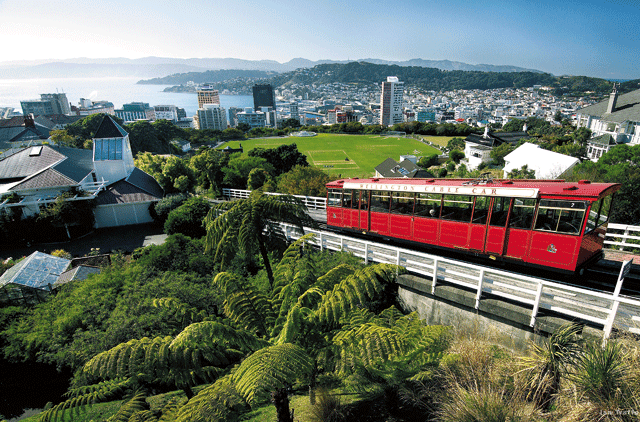
New Zealand's character, history and climate have always been shaped largely by the country's isolated position. The original inhabitants called this place, which in fact consists of two islands, Aotearoa. This can be translated as ‘land of the long white cloud' as, according to the legend, the cloud was the first thing these inhabitants saw before they noticed the land in the Pacific Ocean. Due to its location right opposite the prime meridian, New Zealand claims to be the country where the sun rises first.
The capital, Wellington, often affectionately called ‘Windy Wellington', is situated at the southern tip of the more northerly of the two islands. The city is stretched out betweena busy harbour and sumptuous green hills and is a good example of the balance between nature and urban life that New Zealand is known for. However, in the last 20 years, Wellington has also evolved into a lively and ambitious cultural metropolis. It is now a city full of art and art treasures and home of the Museum of New Zealand Te Papa Tongarewa, of various orchestras, ballet and dance groups and - who would expect it - the centre of a remarkable film industry. Well-known director Peter Jackson comes from Wellington and it was here that large parts of his film trilogy, The Lord of the Rings, one of the most expensive and successful productions of all time, were shot. Needless to say, this gave rise to a further nickname for the city, ‘Wellywood'.
With an exhibition space the size of about three soccer fields, the Museum of New Zealand Te Papa Tongarewa is one of the largest national museums in the world. Opened in 1998, it shows the influence of all cultures on today's New Zealand. It accommodates the national art collection, including some of the most impressive pieces of art of the Maori, and offers plenty of space for important exhibitions from all over the world.
Wellington also boasts a number of architectural highlights, for instance the Parliament complex, not far from Lambton Harbour. This actually consists of three separate buildings: the Parliamentary Library dating from 1899, the actual Parliament House in the classical style from 1918 and the so-called ‘Beehive', based on a design by Scottish architect Sir Basil Spence, which was officially opened by Queen Elizabeth II in 1977.
Property has always been the New Zealander's favourite investment and the country has one of the most investor-friendly property environments in the Western world. However, it must said that residential sales were at their lowest level in nearly two decades in January this year. This can partly be attributed to uncertainty regarding property-related tax questions. But as the government has in the meantime ruled out proposals to introducea land tax or a new tax on residential investment properties, the market is expected to pick up again soon. Currently there are a lot of properties on offer and this is a buyer's paradise which offers plenty of time to select the right home. Particularly popular are the areas of Wellington, Auckland and Christchurch, which also offer excellent rental prospects. If you are interested in a property, your agent will usually be able to reserve it for three days with no obligation to invest. This effectively takes the property off the market while you make your decision. Once your decision is taken, you have to pay a deposit which usually amounts to 10 per cent of the purchase price and is then held in escrow. If, for whatever reason, the purchase is called off, the deposit is returned to the buyer. Otherwise, the remaining amount is required at settlement or when the building is completed.
Buying property requires New Zealand legal representation and the acquisition of property must be carried out in writing to be effective. One of the most critical parts of transferring ownership of property is the conveyancing. This process includes aspects such as checking land boundaries, ownership, zoning, and that all renovations or extensions have council building approval. The lawyer will not only prepare the contract prior to signing, but also handle the proceedings with the land registry, which is compulsory.








